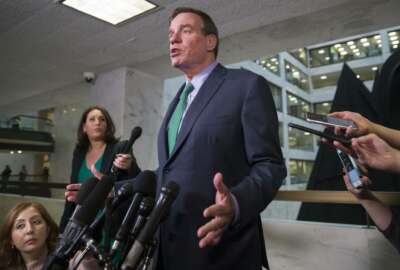

John Grobe, president of Federal Career Experts, specializes in prepping feds for retirement and is Mike Causey's guest on today's episode of Your Turn.
In a column back on Jan. 22, I wondered whether the record-long government shutdown might be the trigger that would set off the tsunami. Now people are waiting for the March numbers to see if fed up feds are starting to vote with their feet.
John Grobe, president of Federal Career Experts, specializes in prepping feds for retirement. His ears perk up anytime there is talk of a retirement tsunami, and he’s my guest on today’s episode of Your Turn at 10 a.m. EDT. Listen at www.federalnewsnetwork.com or 1500 AM in the Washington, D.C. area.
Today’s subject is retirement, is it time for you and if so, are you ready? It’s a timely question because the chaos caused by the shutdown — back pay and retirement claims delayed — has some people questioning how much longer they want to stick around. So John wrote the following on retirement preparation:
“In order to be eligible to retire, certain combinations of age and length of service must be met. Under [the Federal Employees Retirement System], the retirement criteria are 62 years old with five or more years of service; 60 years old with 20 or more years of service; and minimum retirement age between 55 and 57 years old, depending on one’s year of birth and 30 or more years of service. For the few [Civil Service Retirement System] participants who are still working, the only difference in the retirement eligibility criteria is that someone who has 30 or more years of service can retire at age 55, regardless of their year of birth.
“If one were to leave federal service before attaining retirement eligibility, they will become eligible for a deferred pension at a later date if they have five or more years of creditable service at the time of their resignation. Those under FERS who resigned prior to retirement eligibility would become eligible for deferred retirement when they reached any of the FERS criteria spelled out in the above paragraph.
“For someone under CSRS who resigned prior to retirement eligibility — very few CSRS employees are not already eligible to retire — they would become eligible for deferred retirement at the age of 62, regardless of how many years of service they had. Deferred retirees are not entitled to [Federal Employees Health Benefits] coverage in retirement.
“If you’re thinking of retiring from federal service, you want to look at two things: Money and time. First, will you have the money to continue to support your standard of living? Second, what will you do with the time you will have when you stop working?
“Let’s look at money first. A common rule of thumb used by financial advisers is that a person who retires on 80 percent of their pre-retirement income will have a standard of living similar to their pre-retirement standard. You want to ask yourself if the combination of your FERS or CSRS pension, Social Security and Thrift Savings Plan withdrawals will add up to 80 percent.
“Someone with 30 years of service is likely to get close to 60 percent from their pension and Social Security, with the TSP or other investments being called on to provide the rest. Is your TSP up to the task, or will you have to find part-time work to fill in the gap? If you will need to find part-time work, you will have to beware of the Social Security earnings test if you are under your Social Security full retirement age (FRA). For most readers of this article, their FRA will be 66 or 67 years old.
“Take a look at your current take home pay and compare it with the take home income that you will receive in retirement. Is the gap too large for your comfort, or are you already close to having the same take home?
“How about time? It’s a good idea to have a plan for what you will do with the extra time that you will have once you are no longer working. Some retirees, especially those who loved their jobs, have a hard time finding the same level of satisfaction from retirement activities. Of course, those who are indifferent to, or perhaps loathe, their jobs have far less to lose. Factor your life expectancy into this decision as well. If you have a shorter life expectancy, retirement will beckon you more strongly. You may have places to which you want to travel or grandchildren you want to spend time with.
“It’s best to have plans that cover both your retirement income and your retirement activities in place, or at least in mind, before you pull the plug on your federal career. Don’t jump from the frying pan into the fire because you’re disgusted with politicians and shutdowns. Think first about you and your loved ones.”
If you have questions for John send them to mcausey@federalnewsnetwork.com before showtime. The episode will also be archived on our home page for future listening.
By Amelia Brust
During public executions of the French Revolution, market women known as “tricoteuses” would sit beside the guillotine and knit, often making caps. They were veterans of the 1789 Women’s March Versailles, who had lost their right to public assembly in the National Convention due to rowdy behavior, and so they somberly took their seats daily at the Place de la Révolution.
Source: Wikipedia
Copyright © 2025 Federal News Network. All rights reserved. This website is not intended for users located within the European Economic Area.
Mike Causey is senior correspondent for Federal News Network and writes his daily Federal Report column on federal employees’ pay, benefits and retirement.
Follow @mcauseyWFED


